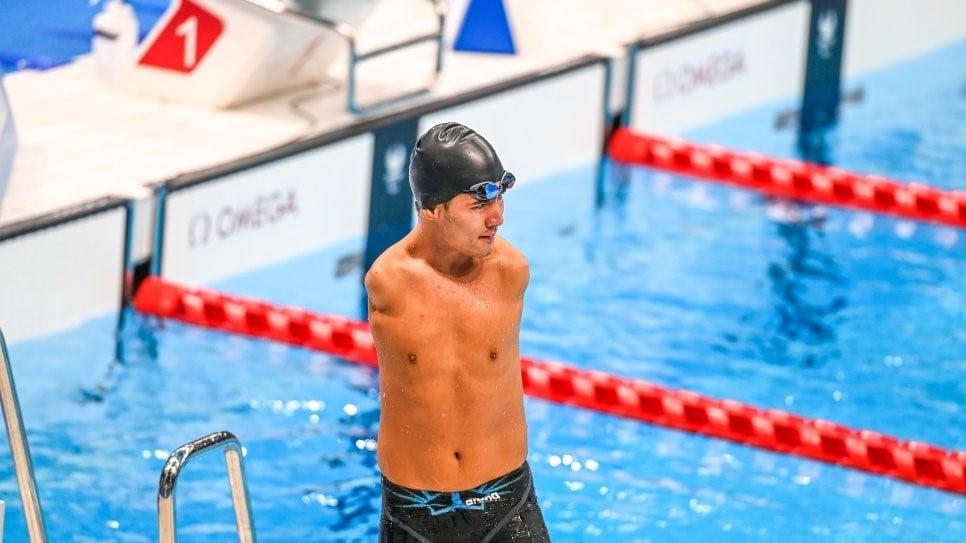Refugee Paralympic Team leaves legacy of hope in Tokyo Games

Refugee Paralympic Team leaves legacy of hope in Tokyo Games
As in any sporting event, there were accomplishments to celebrate as well as moments of disappointment in the Tokyo 2020 Paralympic Games.
Abbas Karimi, born without arms, advanced to the finals of the S5 50-meter butterfly with a personal best of 36.36 seconds.
Alia Issa, the team’s first woman who competed in the club throw, whose brain was damaged when she had a high fever as a young child, reached 16.33 meters in the club throw, just short of her personal best. Competing in the discus, Shahrad Nasajpour beat his best mark from five years ago in Rio.
Anas Al Khalifa, who fled fighting in Syria and now lives in Germany, placed seventh in the kayak single KL1 class, a strong showing after only a year of serious training, and is the flagbearer for the Paralympics closing ceremony on 5 September.
Anas has limited use of his legs after falling from a second story building while installing solar panels. Sliding into despair after his accident, he said kayaking changed his life.
“My physiotherapist really pushed me hard and showed me that sport was really important for my rehabilitation process because it gives you hope. It really lifts you when you’re at the bottom and the lowest point in your life,” he said. “It was a way of bringing me out of the darkness I was feeling.”
Swimmer and two-time Paralympian Ibrahim Al Hussein, who lost his lower right leg in a bomb blast during fighting in Syria, exuded enthusiasm throughout. Affectionately referred to as the unofficial captain by teammates, Ibrahim was often seen waving and smiling to people on the street while riding the bus to the pool. He thanked Japanese organizers for holding the Games at a very challenging time during the pandemic.
“From the time we left from the Paralympic Village to the venues here and seeing all the local people waving to us, it made us feel warm and made me feel really happy,” he said.
Members of both teams said the experience bolstered their confidence, and eagerly looked forward to carrying the momentum to Paris 2024 – just three years away.
In cooperation with partners including the IOC and IPC, UNHCR will continue to promote access to sport in refugee camps and communities – areas that often lack sporting equipment or organized sporting activities, particularly for those living with disabilities. UNHCR sees sport as a powerful tool for building confidence and skills, promoting mental and physical well-being and bringing communities together.
The Refugee Agency’s commitment to supporting refugees with disabilities goes hand-in-hand with the mission of the Paralympic Movement, which was launched by Sir Ludwig Guttmann as a way to repay the kindness he experienced as a refugee who fled Nazi Germany before the Second World War.
“We will continue our work to create a world in which all displaced people, including those with disabilities, can equally access and participate in sport,” said Deanna Bitetti, a senior communications officer working out of Tokyo.
Both the Olympics and Paralympics provided an opportunity for host nation Japan to promote greater awareness about displaced people.
Tokyo’s Bunkyo Ward, which served as the Refugee Paralympic Team’s host town, organized workshops for residents on the global refugee crisis and held online sessions with team representative Ileana Rodriguez, a former refugee from Cuba and now an American citizen.
Parfait Hakizimana, a Burundian refugee who set up a taekwondo club in the Mahama Refugee Camp where he lives in Rwanda, was thrilled to participate in the sport’s debut in the Paralympics. He was unfortunately injured during his first-round loss but saw his presence on the team as a way to “help refugees around the world see that their dreams come true as well.”
Parfait also appears as a video game avatar in a game released by JPGames, the developer behind Pegasus Dream Tour, the official Paralympics video game. The game also features Parfait’s wife and child as spectators.

Refugee Olympians were the main characters in a book with manga-like illustrations published by Japan’s Kadokawa Corp. Geared toward youth, the book tells the stories of the hardships overcome by seven athletes who competed in Rio, including swimmer Yusra Mardini, with maps of routes they took when fleeing their homelands. “If you read their stories, you could get courage and hope,” the book jacket says.
Support came from elsewhere, too. From the Cayman Islands, a group of women sent handmade pins for members of both teams depicting UNHCR’s logo combined with the Olympic or Paralympic symbols.
A card from the women, led by artist Deborah Kern and supported by Rachel Klein, said they had learned that the refugee teams didn’t have a special pin to wear, as many national teams do. “We wanted to make sure you all had special pins of your own,” they wrote. “Thank you for inspiring us!”
Sanda Aldas, a refugee Olympian originally from Syria who competed in judo, said tears came to her eyes when she entered the stadium during the Opening Ceremony because she was overwhelmed by the idea of representing refugees everywhere and because her parents had desired so deeply that she could compete in the Olympics.
“There is always hope and don’t stop dreaming,” Sanda tells fellow refugees. “Don’t listen to those who tell you that you cannot reach your goal — just work hard. It won’t be easy but believing in yourself can make all your dreams come true, not only in sport but in life in general.









